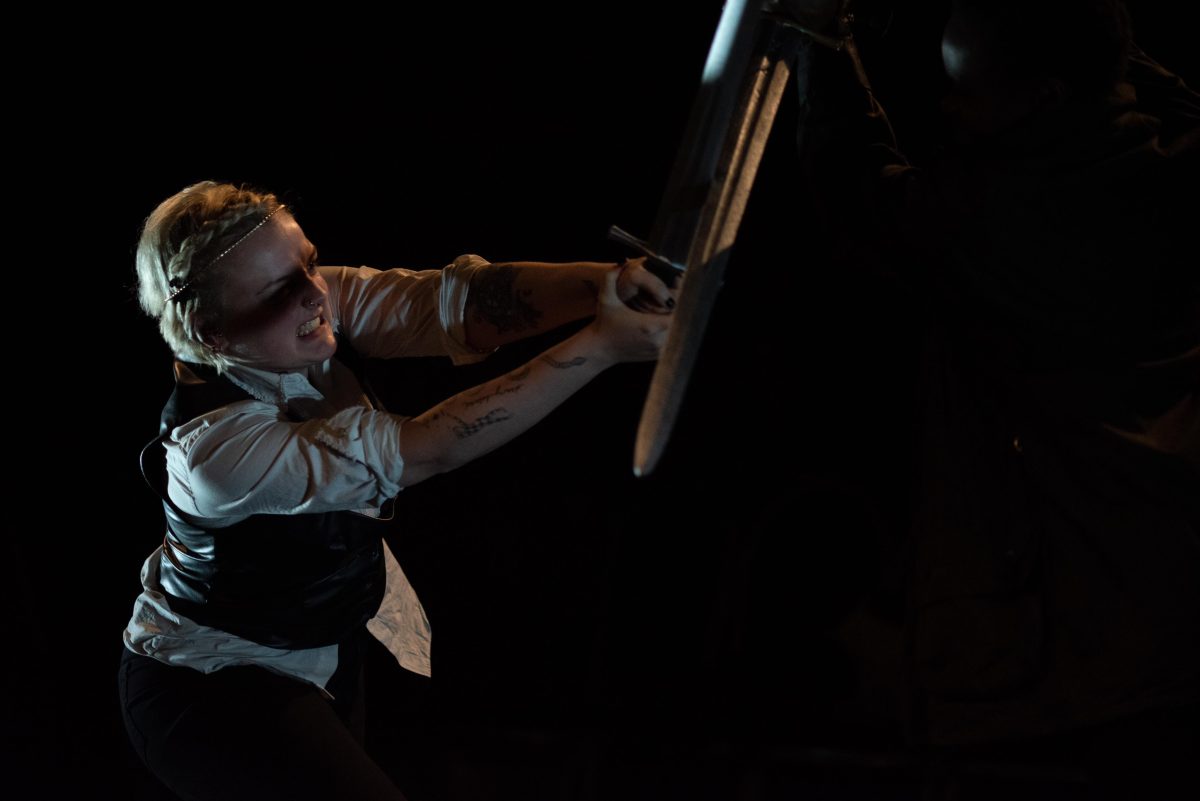Last Saturday, having witnessed one king crowned, I was off to see another slain. Clambering down the steps of the Michael Pilch, I was faced with smoke and lights and two banks of mostly taken seats. Despite a warning on the door of violence towards children, several were sitting in the vulnerable front row. These brave sorts were to be my companions through two hours of Macbeth. Bravery, however, was not the only kingly virtue on display; truth shone forth as, in front of me, one soldier of honesty took his BeReal. Indeed, before the play started there was little else to do or see; the sole piece of set was a hanging piece of patterned fabric. The room was very small; sitting in the raised second row I felt at times as visible as a performer.
The black tale of Macbeth began with three white witches. Gillian Konko, Hafeja Khanam and Rosie Owen, dressed in bridal attire, dispatched their rhymes and prophecies with an eerie measuredness that – no less sinister for this – recalled the purring purple lips of CBBC’s Trapped. These three actors would reappear as others from among the population of minor characters that fringe Macbeth; servants, messengers and murderers. That the same three players double these roles is common enough, but I was fascinated by their decision to play them all with the same mannerisms as the witches. The servants attended with aloofness; the messengers announced without haste; and the murderers killed as though the “keen knife see not the wound it makes”. This uncannily stitched together a cast of lackeys and henchmen, peopling an uneasy world in which “fair is foul and foul is fair”, and black magic governs malignantly from afar. The effect was compelling.
As black magic (or is it mere fate?) pushes and pulls the characters of Macbeth, guilt falls most conspicuously on the King who “play’d most foully” for the throne. But it perhaps falls more chillingly on his wife. Lady Macbeth, played by Juliette Imbert, is the icy counsellor of her husband’s misdeeds who entreats the spirits “unsex me here, and fill me, from the crown to the toe, top-full of direst cruelty!” She pushes Macbeth to regicide; when he is wracked with guilt she bids him sleep. Her implacability seems absolute, until it is ruptured abruptly in the fifth act when, gripped by insanity, she is found pacing in her sleep, rubbing nonexistent blood from her hands: “out, damned spot!” Juliette Imbert was brilliant and convincing as Lady Macbeth, as her subtle mind leapt from plan to execution. Portraying her madness, Imbert showed skill and flexibility, and, importantly, committed to it – I was petrified in my seat.
So was I too during the second act, where Macbeth and his wife kill the king. OUDS president Leah Aspden played the lead alongside Imbert. The bloody deed is committed off-stage while the audience stays with whichever fretful partner is left behind to picture all the ways in which the other might have bungled it. Lady Macbeth’s anxiety is placated by her husband’s conviction, which then pales almost to remorse, only to be roused again by his wife’s biting urgency: “the deed must not be thought after these ways: so, it will make us mad.” When Macbeth is left again alone, an unbidden knocking rekindles his misgivings of the deed. Aspden was an excellent fearmonger: “Will all great Neptune’s ocean wash this blood clean from my hand? No, this my hand will rather the multitudinous seas incarnadine, making the green one red.”
The rest of the play was fleshed out by a panoply of Scotch noblemen in wax jackets, and royalty in defiantly anachronistic navy suits. The costumes in general eschewed descriptiveness, instead prioritising role delineation, which let the performances come to the fore – like the drummer or bassist who plays what is right for the song, rather than to show off. Molly Evans’s sound design was similarly discreet, limiting itself to rain, marching, and the aforementioned knocking in Act II. When, from my seat, this nameless rap rang out behind and to the left of me, I felt as surprised as the edgy Macbeth. Elsewhere, Hetta Johnson was a dignified Macduff, and Bella McInroy was gripping as Lady Macduff, whose fascinating, brief appearance makes her murder all the more senseless. Ethan Bareham brought character to Malcolm, and gave motive to Shakespeare’s puzzling scene in which the heir apparent, apparently as a test of belief, convinces Macduff of his lust and avarice, only to reveal that it was all an extravagant lie: “such welcome and unwelcome things at once, ‘tis hard to reconcile.”
This was an excellent production of Macbeth. A robust cast and unobtrusive direction gave it teeth when teeth were wanted and left it lean elsewhere. I was led confidently through this tale of terror and remorse, which, in a university rattling with shaky Shakespeare, is a high compliment indeed.
5/5

